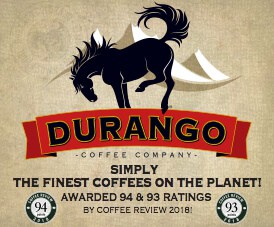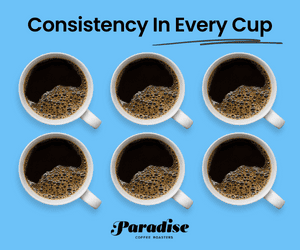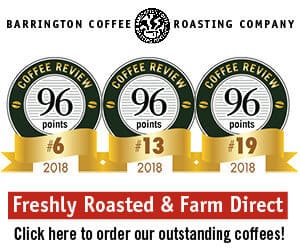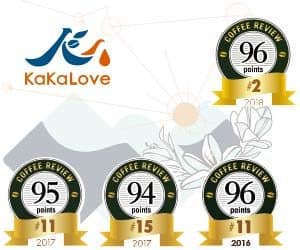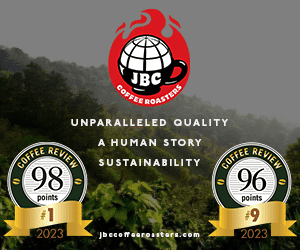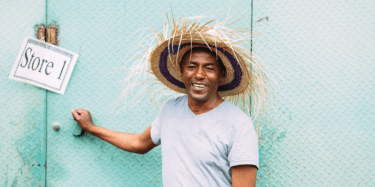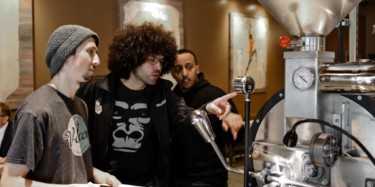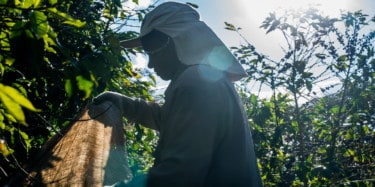Courtesy of Kenneth Davids, 21st Century Coffee: A Guide Anyone who reads a newspaper is aware of how arbitrary the concept of nation-state can be. National boundaries often divide people who are similar, and cram together those who are different. A Canadian from Vancouver has considerably more in common culturally with an American from across the border in Seattle than with a fellow Canadian
SEARCH RESULTS
Haitian Hound Haitian Blue Dark Roast
Produced by smallholding members of the COOPACVOD cooperative entirely of the Haitian Blue variety of Arabica, and processed by the washed method (fruit skin and flesh are removed from the beans before they are dried). Certified USDA organic; shade grown. Cafe Kreyol is a roaster in Manassas, Virginia with the mission of creating sustainable employment by way of specialty coffee. Visit
Shop the Top 30 Coffees of 2021
Coffee Review‘s mission is to help consumers identify and purchase superior quality coffees and, in the process, help drive demand and increase prices to reward farmers and roasters who invest time, passion, and capital in producing high quality coffee beans. Many of our readers seek out highly rated coffees for their own enjoyment or as thoughtful gifts for coffee lovers. Coffees that appear
Haitian Blue Zombie Desert
This exceptional coffee was selected as the No. 27 coffee on Coffee Review’s list of the Top 30 Coffees of 2021. Produced by smallholding members of COOPACVOD, led by coop member Mariane Merisier, from trees of the Blue Mountain, Typica and Bourbon varieties of Arabica, and processed by the washed method (fruit skin and flesh are removed from the beans before they are dried). Certified USDA
Coffee as a Force for Good: Roasters Who Give Back
Like everything bought and sold, coffee can be a vehicle for profit or a tool for changing the world. Sometimes, it is both. 2020 was, unequivocally, a difficult year for the coffee industry, globally speaking, as it was for many of us working in that industry. One response to the challenges of the COVID-19 pandemic is to help others make it through the storm. Our report this month
#She_Builds
This coffee tied for the third-highest rating in a cupping of “Cause Coffees” for Coffee Review’s March 2021 report. Roasters of these coffees contribute a portion of proceeds to non-profit organizations doing work to improve the lives of others, locally or globally. A blend of two coffees: a washed Haiti and a natural-processed Ethiopia. Sales of this coffee benefit Moonshot Academy, a leadership
The Year 2020 in Coffee: Challenges, Trends, Surprises & Knockouts
In 2020, COVID-19 devastated lives and businesses, challenging the global specialty coffee community to its core. On the producing side, the pandemic added still another daunting challenge to growers facing endemic low coffee prices and an ongoing battle with leaf rust disease in Latin America. On the consuming side, roasters saw the pandemic shutter their bread-and-butter café businesses while
Revolution Medium Roast
Produced in the Blue Pine Forest of Haiti from the Typica and Blue Mountain varieties of Arabica and processed by the washed method. Kafe 1804 is a specialty coffee roaster founded by David and Gewaldine Dallemand, specializing in the coffees of Haiti. Visit https://www.kafe1804.com/ for more information.
Independence Dark Roast
Produced in the Blue Pine Forest of Haiti from the Typica and Blue Mountain varieties of Arabica and processed by the washed method (fruit skin and flesh are removed before drying). Kafe 1804 is a specialty coffee roaster founded by David and Gewaldine Dallemand specializing in the coffees of Haiti. Visit https://www.kafe1804.com/ for more information.
Estelí Nicaragua
This exceptional coffee was selected as the No. 18 coffee on Coffee Review’s list of the Top 30 Coffees of 2020. The coffee tied for the second-highest rating in a cupping of coffees roasted by Black-owned coffee companies for Coffee Review’s August 2020 report. Produced by Samuel Zevala Gonzalez entirely of the big-beaned Maracaturra variety of Arabica and processed by the honey method, in which
Jacmel Haiti
This coffee earned the fifth-highest rating in a cupping of coffees roasted by Black-owned coffee companies for Coffee Review’s August 2020 report. Coffee trees were brought to Haiti in 1715 when the country was colonized by the French. Farmed by enslaved people, most crops were destroyed in the Haitian revolution of 1791. Efforts to revitalize the coffee industry in Haiti continue in the face of
Recognizing Coffees from Black-owned Coffee Companies
For new readers who may not be familiar with Coffee Review, we introduced the first-ever 100-point, wine-style coffee reviews to the specialty coffee industry in 1997. Our mission is to help consumers purchase superior quality coffees while recognizing and rewarding the farmers and roasters who produce these coffees. Since our founding, Coffee Review has reviewed coffees in an
Two Centuries of Enslaved Labor: The Contributions of Blacks in the Early Americas Coffee Trade
Introduction by Kenneth Davids, Editor in Chief Phyllis Johnson, longtime president of green coffee importer BD Imports, has emerged as an eloquent spokesperson for acknowledgement and change at a time when specialty coffee is searching for an effective response to systemic racism in the U.S. Her writing and speeches have rallied the specialty coffee community and she has created an
Coffee Glossary: S
Sanani. A comprehensive market name for coffees from several growing regions west of Sana'a, the capital city of Yemen. Usually a lower-toned, somewhat less acidy version of the Yemen style. Santo Domingo. Coffee from the Dominican Republic. High-grown Dominican coffee is a fairly rich, acidy coffee with classic Caribbean characteristics. Lower grown Dominican coffees tend to be softer and less
Coffee Glossary: H
Haiti. The best Haiti coffees are low-acid, medium-bodied, and pleasantly soft and rich. At this writing, virtually all Haiti coffees entering the United States are produced by a large group of cooperatives and marketed under the name Haitian Bleu. Hard. Trade term for low-quality coffee, in contrast to mild coffee. In Brazil, Hard is a grade name for coffee that has been tainted by
Dominican Republic Coffee
Courtesy of Kenneth Davids, 21st Century Coffee: A Guide Coffee from the Dominican Republic is occasionally called Santo Domingo after the country’s former name, perhaps because Santo Domingo looks romantic on a coffee bag and Dominican Republic does not. Dominican coffee has experienced neither the turbulent history of Haiti coffee nor the success of Jamaica Blue Mountain. The specialty coffee
Around the World in a Demitasse
For those interested in exploring single-origin coffees as espressos, here is an overview of the better-known coffees of the world from an expresso perspective. Powerfully Acidy Coffees. The best-known are Kenyas, Strictly Hard Bean Costa Ricas and Guatemalas, Yemen Mochas, and the better Colombias. These are all high-grown, dense-bean coffees that display bright, acidy notes in nut-brown roasts
Organically Grown Coffees
The granddaddy of all cause coffees, and still the most impeccable in its credentials, is the organically grown category. Organics, as they are called in the coffee business, are coffees that are certified by third-party agencies as having been propagated, grown, processed, transported, stored, and roasted without contact with synthetic chemicals -- particularly without contact with pesticides,
Haiti Coffee
Courtesy of Kenneth Davids, 21st Century Coffee: A Guide Haiti, which shares the large island of Hispaniola with the Dominican Republic, has a long coffee history. As a colony of France, by 1788 Haiti produced roughly half of the world’s coffee, a production entirely dependent on the labor of slaves. Three years later, in 1791, during the ferment created by the French Revolution, the slave
From Europe to the Caribbean
The first sprouts from the noble tree reached Martinique in the Caribbean in about 1720, due to the truly heroic efforts of Chevalier Gabriel Mathieu de Clieu, who follows Baba Budan into the coffee hall of fame. De Clieu first had difficulties talking the authorities in Paris into giving him some trees (he finally stole them), but this was nothing compared with what he went through once at sea.


